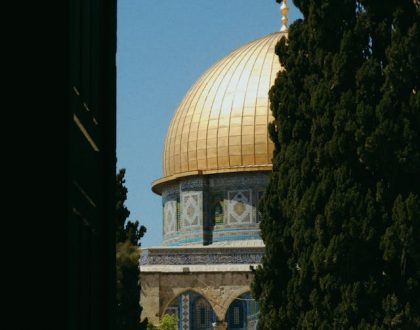Faith and action- Tarawih reflections 7

Righteousness is not in turning your faces towards the East or the West. Rather, the righteous are those who believe in Allah, the Last Day, the angels, the Books, and the prophets; who give wealth, despite (their) love for it, to relatives, orphans, the poor, travellers, those who ask (for help), and for freeing captives; who establish prayer, pay Zakat, fulfil the contracts they have agreed, and who are patient in times of suffering, misfortune, and times of hardship. [2:177]
This ayah of Surat al-Baqarah is about birr, righteousness. This is a comprehensive word in Arabic that encompasses everything that is good and pleases Allah.
After the qibla changed, there was great discussion in the community about whether salah was only accepted if performed in a particular direction. This ayah was revealed to tell them that this was missing the point: it is not the direction you are facing that makes you righteous but your intention to follow the command of Allah.
In the same way, your clothes and status won’t make you a better person unless you have belief and action. This ayah therefore defines what is birr, with five articles of belief and five points of action.
Articles of belief
1) Allah
2) The Last Day. Arabs didn’t use to believe in the Hereafter or resurrection. This is why so many Makki verses, and some Madani ones, focus on the Day of Judgement. They used to believe that after they died, that was it. However, this is a reminder that there will be accountability in the next life, even if you can get away with your power and armies and allies in the dunya, even if the ICJ can’t bring you to justice, the divine court will.
3) Angels
4) Books
5) Prophets
This is similar to what we know as the pillars of imaan, except for qadar which is not mentioned here.
Points of action
Belief alone is not enough; you have to translate that into action. ‘Believe and do good deeds’ are mentioned together fifty times in the Quran.
1) Spending money for Allah’s sake, even though money is very dear to us. Which one will win: obeying Allah or obeying your nafs and hoarding money? When you love Allah you have to give for his sake. Six categories of people whom we should give to are listed:
a) Your relatives. This is double charity because not only are you giving, but you are establishing good relations and connecting blood ties. Many people are very generous to everyone except their own family. Allah is saying no, start with those who are under your care. Sadaqa can be given to any member of the family, but we can’t give zakat to our parents or grand parents, children and grandchildren. We can give zakat to siblings, aunts, uncles or cousins etc.
b) Orphans. The Shariah definition of an orphan is a child whose father has died and who hasn’t reached puberty.
c) The masakeen – people who have an income, but it is not sufficient for their basic needs. For example, in the story of Musa and Khidr, the owners of the boat are described as masakeen.
d) Travellers – people who may be rich in their own country, but have nothing when you encounter them.
e) Beggars – those who ask for Allah’s sake, but do not make it a profession.
f) Slaves. This is a category which doesn’t exist today in the same way.
Then the ayah goes back to the rest of the actions:
2) Establishing salah
3) Paying Zakat
4) Fulfilling your promises
5) Being patient when calamity hits.
The five pillars of Islam
You may wonder why this list of five actions is not the same as the five pillars of Islam that we know.
In fact, the pillars were revealed very late before the Prophet Muhammad ﷺ died. The last one was Hajj, which was only revealed as an obligation around the year 8AH. The famous Hadith Jibril, when the angel Jibril came to the Prophet ﷺ and asked him about the pillars also took place around 8 or 9 AH. He passed away soon after in 11AH.
These pillars were established when Islam was complete. After all the hard work that was done – 13 years in Makkah and 10 years in Madinah, that was when Allah finalised the mission statement and aims and objectives of Islam for the Muslims.
We ask Allah to enable us to always translate our imaan into practice that pleases Him.
Based on the reflections of Shaykh Haytham Tamim
Transcribed by Hana Khan
- The forces of Allah and the fate of the falsifiers
- Climbing the stairs: How to continue your spiritual journey post-Ramadan
- How Allah strengthens the hearts of believers
- Why should you follow up one good action with another one?
- Don’t be a Ramadani person – Be a Rabbani person.
Recommended Posts

The forces of Allah and the fate of the falsifiers
April 26, 2024

How Allah strengthens the hearts of believers
April 19, 2024

